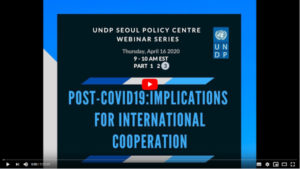
The Global Policy Centre Seoul of the United Nations Development Programme (UNDP) organized three virtual sessions on the impact of the COVID-19 pandemic on international cooperation. The deputy director of the German Development Institute / Deutsches Institut für Entwicklungspolitik (DIE), Imme Scholz, participated in the last session on 16th April with 200 listeners. She emphasised that the COVID-19 pandemic is likely to be typical for the average crisis in the 21st century: it has complex causes and impacts; social and economic costs of the crisis are exacerbated by the insufficient provision of (global) public goods. It is paramount to invest in the resilience of societies, and to shape relief measures and economic recovery packages in a way that they contribute to implementing the SDGs and preventing climate crises.
Jorge Chediek, UN Office for South-South Cooperation, expects that globalisation will be questioned and reduced which will also put export-oriented development pathways into question. The enormous amounts of public spending for crisis relief in rich countries will create public deficits and may destabilise the global financial system and put budgets for international cooperation under pressure.
Tony Pipa, Brookings Institution, demanded that the response capacity of the multilateral system be strengthened. The UN should recommit to its norms and renew itself as an interconnected system. The pandemic shows that the structures for international financial cooperation are out of date as shared norms and cooperation structures for all financial institutions are still missing. Traditional and new donors need to reach a joint understanding of goals and criteria for development cooperation.
Sachin Chaturvedi, Research and Information System for Development Countries (RIS), stated that COVID-19 led to a universal crisis that showed a considerable lack of preparedness also in the North. Ethical principles such as human rights need to be brought back into shaping globalisation, providing global public goods, cooperating in research and development and investing in regional cooperation. The UN – in particular the World Health Organisation (WHO) – need to be given sanction rights.
Stephan Klingebiel, UNDP Global Policy Centre Seoul, stated that the coming months will show whether the COVID-19 pandemic will accelerate the crisis of the multilateral system or enable its courageous reform.
Here you can find a recording of the webinar:

Schreibe einen Kommentar